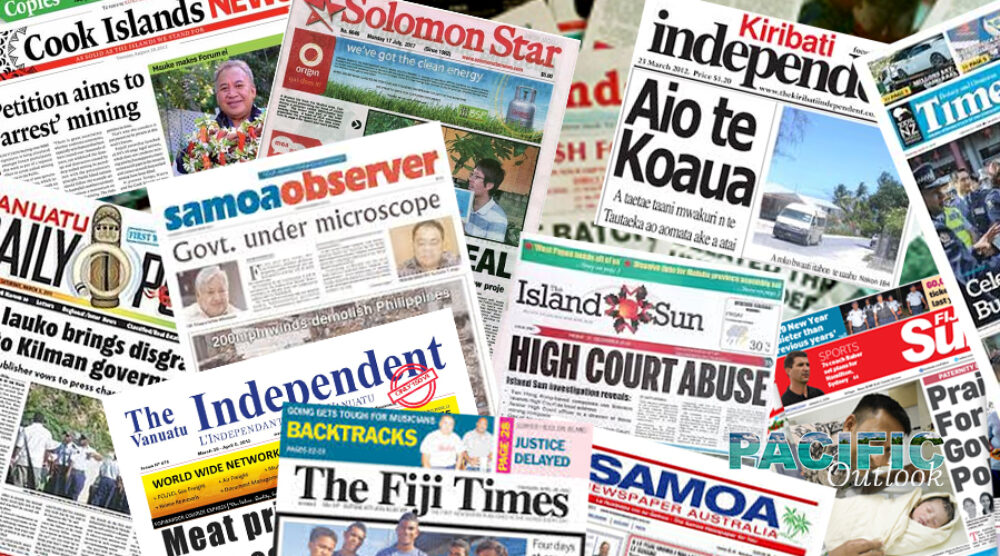Solomon Toktok was my third attempt to establish an independent newspaper in Solomon Islands in 1977. The first one was Kio Kio Nius, the second was Melanesian Nius, but both weeklies were short-lived.
I chose the name Kio Kio, a coastal kingfisher because in some parts of Sol,omon Islands the bird was thought to informvillagers that a ship was sailing along or a man was passing through villages. Kingfishers relayed messages.
This evolved into Melanesia Nius, to cover the Melanesian group countries in the South Pacific as it was becoming a regional bloc to be reckoned with in the early and late 1970s. Fiji and Papua New Guinea had become independent while Solomon Islands and Vanuatu were in the process of gaining independence from their colonial rulers.
But the scope was too wide for me to cover and so I decided to drop that name and focus on just the one country, my own. I founded Solomon Toktok with the slogan “Independent – Outspoken – Effective” as the guiding news policy of the newspaper.
I believed Solomon Toktok ought to offer alternative views as the Government operated the Broadcasting Service, published a government weekly newspaper, Solomon News Drum, and ran the Information Services, which collected mostly government news.
Initially, I ran Solomon Toktok single-handedly: collecting and writing stories, soliciting for advertisements, delivering papers at newspaper outlets, taking photographs, administering accounts and banking, newspaper wrapping and newspaper paste-up or lay-out, a task that I had hated most. It didn’t come easily to me as my training and background were in broadcast journalism. The same went for putting together headlines and captioning photographs.
I leaned on my former boss Ashley Wickham and the late Welshman Teilo, who was in broadcasting, for help in the areas I found challenging.
As a trailblazer in the private media business we faced many challenges, even once we had recruited and trained staff to fill the many roles the business needed:
- Lack of Government support as our alternate views offered by us were new and confronting for politicians, officials and their supporters
- Rarity of people with professional media experience
- High overheads: printing was costly as there were no computers. The company that did our printing also did the type-setting, newspaper layout, darkroom work, printing, newspaper collating and folding
- Insufficient revenue from advertising, subscriptions and sales to meet high printing costs
- The paper lacked a chief reporter as I could not afford to engage one
- My news reporters and graphic artists worked long hours for small pay
In efforts to improve Solomon Toktok I took the following actions:
- I sent a reporter for journalism training at the East-West Centre in Hawaii. He returned a brilliant newsman but was a slow worker
- I took out a loan to buy a printing machine. The idea was to reduce the printing cost but when the printers found out about the printing machine, they refused to do darkroom work for me
- To improve the content, my New Zealand wife, a nurse by profession was engaged to be the chief reporter because she had a nose for news. She undertook a short training course in New Zealand
- My in-laws helped fund a dedicated building for the newspaper so we did not have to pay rent
- A friend from New Zealand, since deceased, helped us with marketing
With the help of my wife’s parents, a building to house the newsroom, the sales room, the dark room, the printing room and administration/accounts room was built so we did not have to pay the rent
However, the effort needed to establish and sustain a business in such a challenging environment took its toll. I was exhausted and my marriage did not survive the journey. After my family relocated to New Zealand, I stayed in Solomon Islands and tried to keep Solomon Toktok afloat for another eight years.
With the absence of my family and tough competition from a new newspaper, Solomon Star which was an offshoot of Solomon News Drum with government support, I finally decided to close down Solomon Toktok in March 1992 and rejoined the state broadcaster, the Solomon Islands Broadcasting Corporation, SIBC.
But what impact did Solomon Toktok have on the regional news-media, especially independent newspaper journalism?
Samoa, Tonga and Vanuatu followed Solomon Toktok with journalists setting up independent newspapers, as their countries’ governments like Solomon Islands in those days, operated broadcasting services and published information service publications.
Independent journalism was not always well received by those in authority. New Zealand journalist, Mike Field, was banned from entering Tonga, Samoa, and Fiji because his approach to news reporting did not go down well with the governments in those countries.
I later became his Solomon-based freelance journalist when he was the Pacific Agent for Agency France Press – AFP and continued to follow his independent style of news reporting for many years after.
AUTHOR
George Atkin is a veteran journalist from Solomon Islands and was the founder and publisher of the independent newspaper Solomon Toktok








